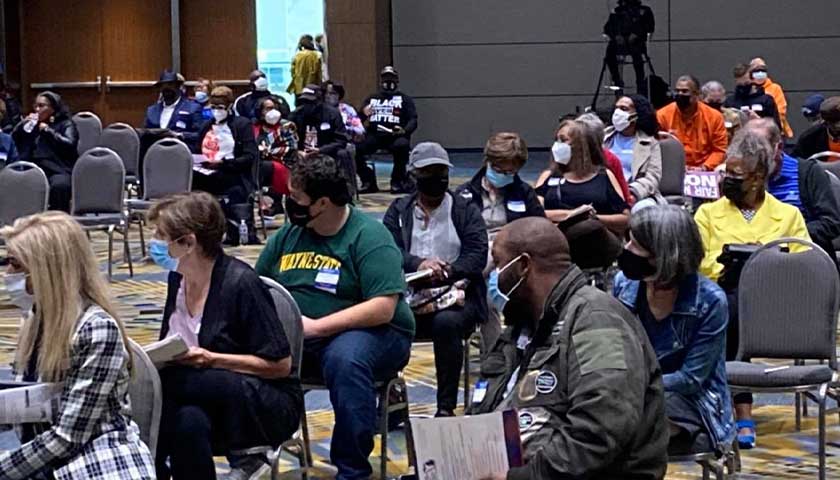by Scott McClallen
The Michigan Independent Redistricting Commission (MICRC) ignored advice from its lawyer when it voted Thursday to limit when commissioners can submit individual maps.
It’s unclear if the vote conflicts with its Constitutional amendment.
Commissioners argued for more than an hour about Constitutional requirements before approving several motions as they pushed proposed collaborative maps.
A map’s final approval requires a majority vote, which must include at least two Republicans, two Democrats and two independent commissioners.
MICRC General Counsel Julianne Pastula said if a majority can’t agree on a map after the 45-day public comment period, members could submit maps without public feedback.
Independents Commissioners Steven Lett and Chair Rebecca Szetela disagreed. They called for a vote to “interpret” the constitutional language differently so individual submissions can be barred after the 45-day public comment period.
“We’re clarifying our interpretation of the statute, or of the constitutional amendment,” Szetela said. “We are not rewriting or redefining the Constitution. We’re just defining how we’re going to interpret it.”
One motion passed 9-3, and allows commissioners to submit individual maps ahead of the 45-day public comment period. If the commission fails to garner majority support for one map, a second motion passed 8-4, which bans the commission from considering maps the public hasn’t scrutinized for the 45 days.
Pastula disagreed with the motion, calling it “adding language.”
“The language is not in the Constitution,” Pastula said. “Whether it makes sense or not is certainly an interesting discussion for another time.”
Szetela said she believed the constitutional language required the commission to provide public notice and 45 days of comment on maps for public transparency.
“We can’t just at the end of the day whip in and bring in any plan that has not gone through public comment,” Szetela said. “I don’t think that’s consistent with what the spirit of the language is. I don’t think it’s consistent with the letter of the language.”
Lett concurred.
“It makes absolutely no sense whatsoever that we could come in at the end of 45 days and not agree upon a plan under the 2, 2 and 2 vote and then come up with totally new plans that nobody had looked at, nobody had debated,” Lett said.
On a 10-3 vote, the commission set a Monday noon deadline for individual map submissions.
MICRC spokesman Edward Woods III told The Center Square that the Commission will hear a second legal opinion on Monday.
If the 2-2-2- Republican, Democrat, and Independent requirement fails, the commission must adopt a plan for that type of district in which:
- (i) Each commissioner may submit one proposed plan for each type of district to the full commission for consideration.
- (ii) Each commissioner shall rank the plans submitted according to preference. Each plan shall be assigned a point value inverse to its ranking among the number of choices, giving the lowest-ranked plan one point and the highest-ranked plan a point value equal to the number of plans submitted.
- (iii) The commission shall adopt the plan receiving the highest total points, that is also ranked among the top half of plans by at least two commissioners not affiliated with the party of the commissioner submitting the plan, or in the case of a plan submitted by non-affiliated commissioners, is ranked among the top half of plans by at least two commissioners affiliated with a major party.
- If plans are tied for the highest point total, Secretary of State Jocelyn Benson shall randomly select the final plan from those plans. If no plan meets the requirements of this subparagraph, the secretary of state shall randomly select the final plan from among all submitted plans under part (14)(c)(i).
The MICRC may have now violated the Constitution twice in 10 days. Last week, Sens. Ed McBroom, R-Vulcan, and Jeff Irwin, D-Ann Arbor, asked Attorney General Dana Nessel for a legal opinion on a closed-door meeting conducted by the committee. The Constitution mandates: “The commission shall conduct all of its business at open meetings.”
When asked if the closed-door meeting violated the Constitution, Pastula said the Commission “received legal advice from their counsel, and that legal advice would not be appropriate to provide in open session, because it’s protected by the attorney-client privilege.”
– – –
Scott McClallen is a staff writer covering Michigan and Minnesota for The Center Square. A graduate of Hillsdale College, his work has appeared on Forbes.com and FEE.org. Previously, he worked as a financial analyst at Pepsi.
Photo “Michigan residents get involved” by Redistricting Michigan.





